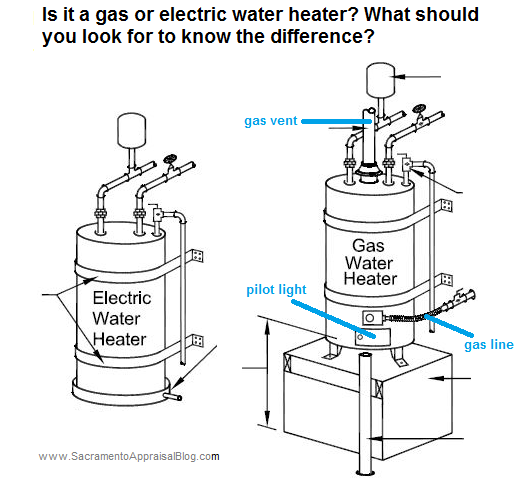After reading this post, you will hopefully be more prepared to play the “FHA water heater” category on Jeopardy. This means you could win lots of money. Okay, maybe not, but let’s do some thinking together anyway.

Is it gas or electric? First off, how do you know if a water heater is gas or electric? Both water heaters look very similar to the untrained eye, but there are some noticeable differences when you really compare the two. As you can see in the image above, there is a gas line going into the gas water heater, but no such line going into the electric water heater. Additionally, there is a vent on top of the gas water heater, but no vent on the electric. You might notice too the gas water heater has a space for a pilot light, but there is no pilot light on the electric water heater. I know this is elementary, but it’s good to rehearse since not everyone is a water heater Jedi.

What does FHA say about water heaters? It’s important to realize FHA does not create or enforce code. FHA simply defers to local code for water heater requirements. This means if local code mandates particular types of water heater straps, requirements for a pressure release valve or whether a water heater is on or off the ground, that’s what the home owner, real estate agent and appraiser should be paying attention to during an FHA transaction (or any transaction).
In the case of the photo above, the gas water heater (do you see the gas line?) was originally directly on the ground when it should have been raised 18 inches off the ground per Sacramento County code. Gas water heaters are required to be elevated so the pilot light is removed from any gas fumes lurking just above the floor. If the water heater had been electric though, it could have been on the garage floor per county code since electric water heaters do not have a pilot light (which means there is not a gas and flame danger). Lastly, regardless of whether the water heater is gas or electric, earthquake straps are required in California on standard water heaters.
Ultimately since the gas water heater was on the ground during an FHA appraisal inspection, it had to be raised to meet current code. This is always what needs to happen during an FHA loan due to local standards. Keep in mind some conventional lenders have strict guidelines about water heaters, but many do not. It is a case by case basis whether a conventional lender would require the water heater to be raised or strapped.
Action Step: If you are wondering what your city or county says about water heater installation for your specific situation, you ought to give the building department a call. There are honestly so many different water heater scenarios depending on size and location, so it is important to ask these questions to your city or county so you can get the definitive answer. I know a thing or two about water heaters, but I won’t know the answers to all of your questions. Please note also that specific water heater requirements in one area of the country may be different from other states (this is again one reason why you should call your city or county).
FHA Article Library: I hope this was helpful. If you’re looking for more information on FHA property or appraisal standards, you can check out other FHA appraisal articles I’ve written.
Any thoughts, questions or stories to share? Comment below.
If you liked this post, subscribe by email (or RSS). Thanks for being here.
Hello Ryan,
I’ve asked to condition a valuation of a property based on the water heater having the straps fully rapped around the heater and not just from one corner to the other as illustrated in “after” photo in your blog. Comments? Thanks, Merle Jones SCREA.
Hi Merle. Thanks for reaching out. Who is conditioning you and why are they asking this? Are they citing local code to say this is what needs to happen?